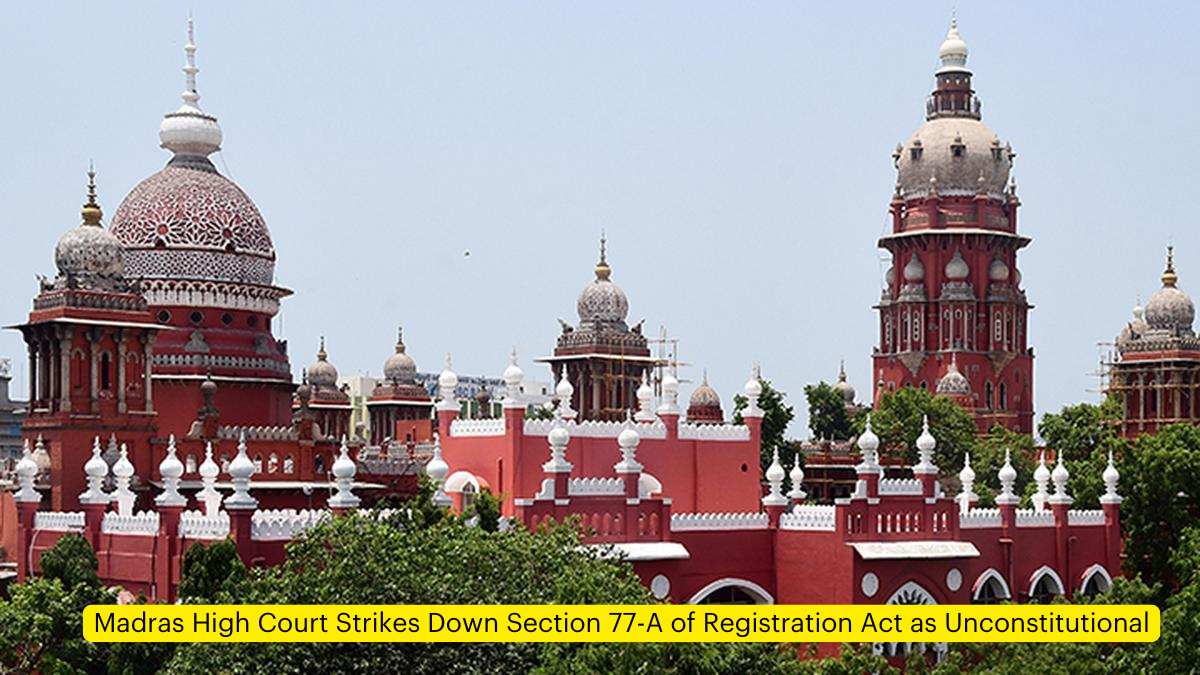In a significant judgment, the Madras High Court has declared Section 77-A of the Registration Act, 1908 unconstitutional. This ruling has far-reaching implications for property registration and ownership rights in Tamil Nadu.
The Contested Provision
Understanding Section 77-A
Section 77-A, introduced to the Central enactment by way of a 2022 State amendment, granted District Registrars the power to cancel documents related to immovable property if they were found to have been registered through fraud or on submission of forged revenue records.
The Court’s Reasoning
Excessive Quasi-Judicial Power
Justices S.S. Sundar and N. Senthilkumar, in their judgment, highlighted that Section 77-A conferred excessive quasi-judicial power on District Registrars. This power, they argued, could potentially cause “unimaginable hardship and irretrievable damage” to real property owners in numerous cases.
Lack of Judicial Expertise
The Division Bench pointed out a crucial flaw in the provision:
- District Registrars, who may not be law graduates or acquainted with legal principles, were being tasked with adjudicating disputes on property titles.
- These officials are bound by circulars rather than legal precedents, raising concerns about the quality and consistency of their decisions.
Potential for Bias
The court expressed concern that District Registrars, as government servants, might show favoritism in disputes where the government has a rival claim. This lack of independence could compromise the fairness of the process.
Implications of the Judgment
Protection of Property Rights
The court’s decision aims to protect the substantial rights of property owners by preventing the unsettling of transactions based on the “unfettered, unguided and unlimited power” conferred on District Registrars.
Maintaining Judicial Primacy
By striking down Section 77-A, the court has reasserted the primacy of the judicial system in resolving property disputes. It viewed the provision as an attempt to create a parallel forum to the judiciary, conferring wide powers on the executive to resolve issues beyond its competence.
The Broader Context
Existing Provisions
The judgment noted that Sections 22-A and 22-B of the Registration Act already empower Registration Department officials to refuse registration of certain documents. Section 77-A extended this power to cancellation of documents registered in contravention of these provisions.
Civil Court Jurisdiction
Historically, disputes arising from such actions were decided by civil courts following due procedure. The introduction of Section 77-A shifted this power to District Registrars, raising concerns about the competence and impartiality of the decision-making process.
Key Observations by the Court
Lack of Finality
The court pointed out that even if District Registrars cancelled the registration of documents, such cancellation would not be absolute or complete. Aggrieved parties could still approach civil courts to challenge these decisions, raising questions about the efficacy of the provision.
Purpose of Registration Act
The bench emphasized that the primary objective of the Registration Act is to maintain public records related to immovable properties. They clarified that the registration of a document does not in itself affect the title of the true owner, and questions of title cannot be decided merely based on registered documents of conveyance.




 Yogi Adityanath Inaugurates IBM’s AI Gov...
Yogi Adityanath Inaugurates IBM’s AI Gov...
 Rajasthan Budget 2026–27 Presented with ...
Rajasthan Budget 2026–27 Presented with ...
 Uttar Pradesh Tables First-Ever Economic...
Uttar Pradesh Tables First-Ever Economic...








